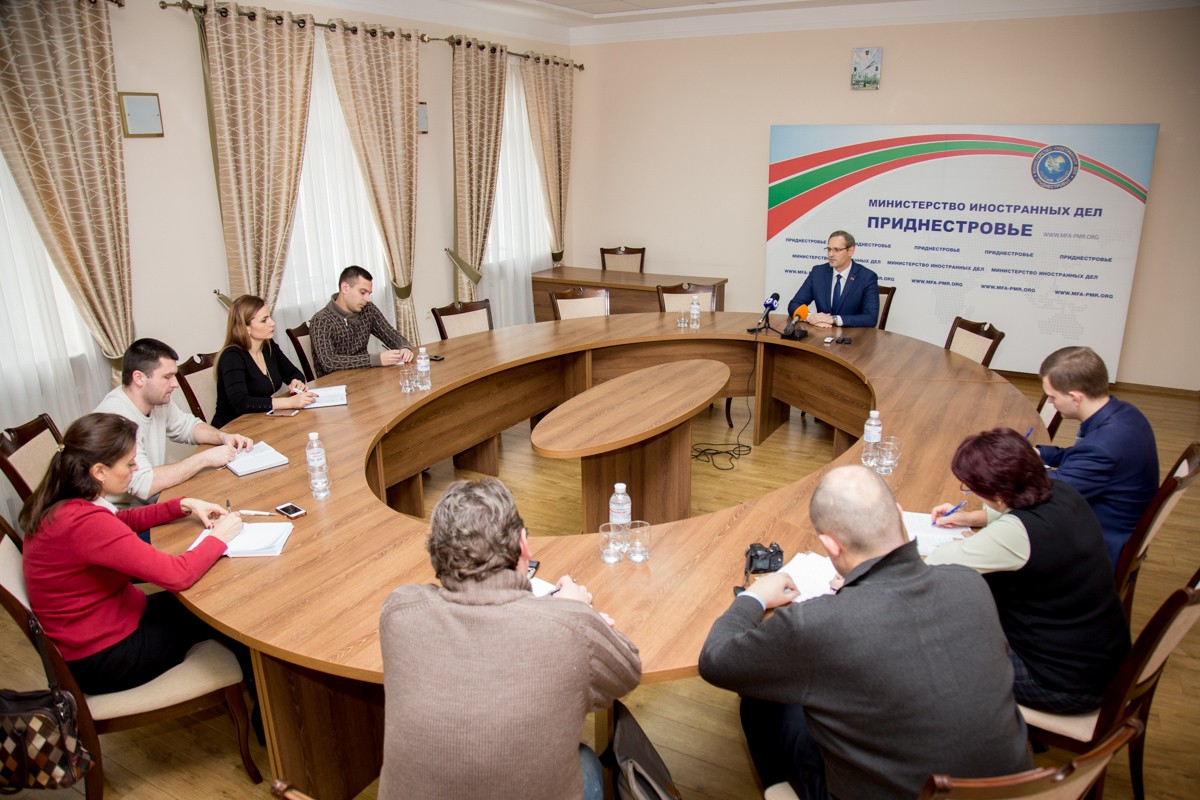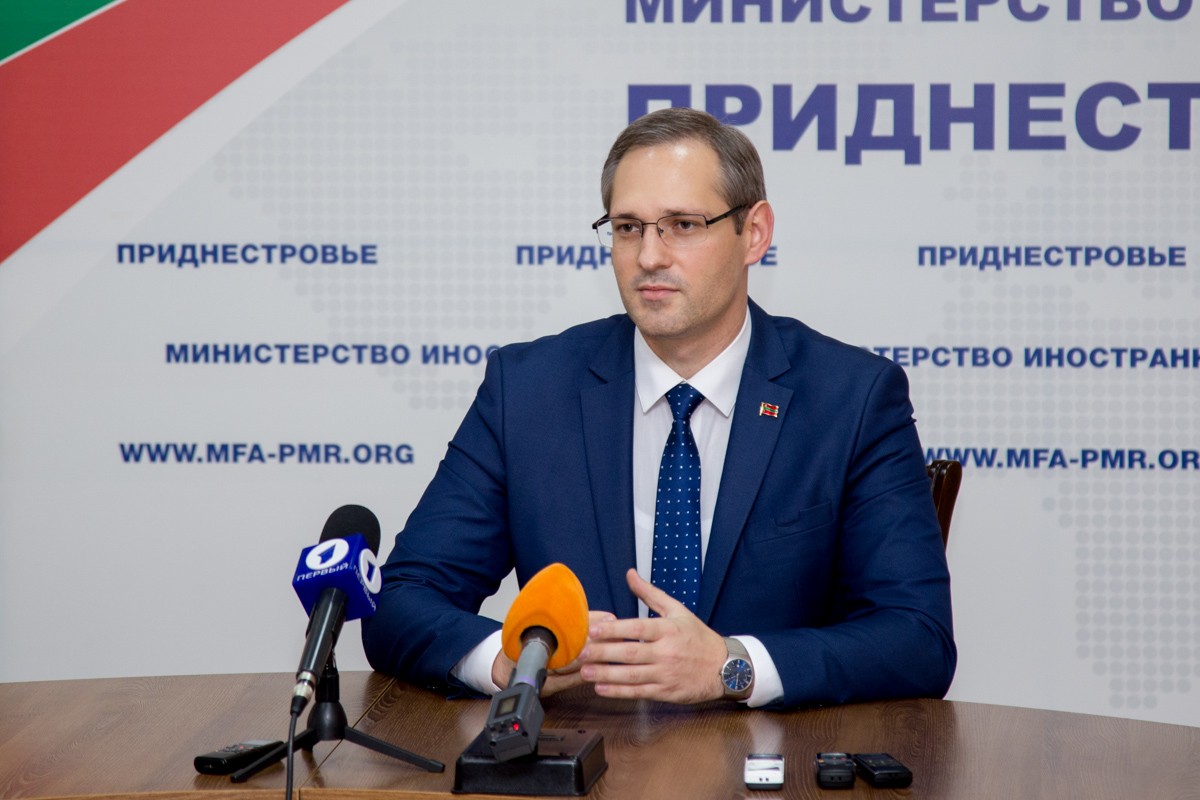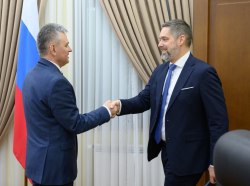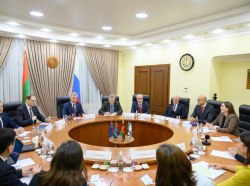Thirty meeting of expert (working) groups in various spheres, nine meetings of the political representatives of Pridnestrovie and Moldova in 2017 have resulted in Kishinev and Tiraspol signing five agreements to resolve a number of socio-economic and humanitarian issues that had long been on the agenda.
Pridnestrovian foreign minister Vitaly Ignatyev spoke about the results of 2017 and plans for the new negotiating season during a press conference.
New challenges
The start of 2017 was very optimistic. Austria, which had assumed the OSCE chairmanship, hastened to declare it would succeed in settling relations between Tiraspol and Kishinev with positive results coming soon. Months passed, meanwhile, and the hope of the Pridnestrovian side that Vienna would succeed Berlin was dying away.
New challenges were added to the problems which Moldova and Pridnestrovie had undertaken to solve by signing the Berlin Protocol in June 2016. But the entire negotiating process was negatively affected by the establishment of a Moldo-Ukrainian customs post at the Ukrainian-Pridnestrovian border. The Austrian OSCE chairmanship refused to solve this issue.
2017 might have remained ineffective if Pridnestrovie had not given an impetus to the negotiating process.
Pridnestrovie’s impetus
It was Pridnestrovie's initiative to open a bridge across the Dniester near the villages of Bychok and Gura Bicului that became an important step towards the resumption of the negotiating process this year. The bridge agreement was followed by four more documents, in which Tiraspol and Kishinev committed themselves to agree on a mechanism of the recognition of university diplomas issued in Pridnestrovie, to solve telecommunication issues, as well as those related to the work of Romanian-language schools in Pridnestrovie and the use of land by Moldovan farmers in the Dubossary District.
"In fact, we have relaunched our dialogue, giving it a completely different level of acceleration. In this situation, not only the parties and experts but also the Austrians have worked quite intensively. Only when the Austrians had realised that the process had been set going, that a number of specific documents had been signed, they invited the parties to take part in a "Permanent Conference..." meeting. And this invitation had no preconditions, which the Austrian chairmanship kept telling us about throughout the year," noted Ignatyev.
According to the minister, the Austrians convened the meeting to give its assessment to the decisions reached by Tiraspol and Kishinev in November. Besides, this "5+2" meeting breathed new life into the Berlin Protocol.
"This year we have actually signed the Berlin 2 protocol because the Vienna declaration signed as a result of our meeting clearly states that the Berlin Protocol provisions that have not been implemented should be resolveв within a tangible time frame. Speaking about Pridnestrovie's motor transport, this issue should be solved by the end of February 2018. The issue of politically motivated criminal prosecution against Pridnestrovian officials should be solved during the next year," explained Ignatyev.
Guarantee mechanism
Besides, a guarantee mechanism should be worked out in 2018 to ensure the implementation of the agreements. This provision of the Vienna Declaration is very important as Kishinev does not implement the obligations it has signed.
"We hope this situation will be reversed and international support in this matter will allow us to move forward on entirely different grounds. It is very encouraging that all international partners noted the progress and active work of the parties and supported the need to work on the Berlin Protocol exclusively on social, humanitarian and economic issues. It has also been recorded in the final protocol that we signed in Vienna," added the foreign minister.
The Pridnestrovian diplomats in Vienna declared the inadmissibility of restrictive measures against our citizens.
"We believe that any form of pressure on one of the parties, which is equal in terms of international participation and which is entitled to appeal to the protection of its interests, is unacceptable in the negotiating process. The final protocol states the inadmissibility of unilateral solutions to any problems. All issues should be resolved only at the negotiating table. I think it is important," said Ignatyev.
New negotiator
The minister underscored that the Pridnestrovian side was consistent and ready to cooperate on socio-economic and humanitarian issues.
By the way, changes are coming in Moldova. Gheorghe Balan, who has been represented Moldova in the negotiating process over the past two years, will be replaced by 35-year-old Cristina Lesnic.
Commenting on this replacement, Ignatyev noted this was an objective process.
"Changes should not harm the most important thing — the process of settling relations and solving socio-economic issues. It is important that approaches should not change for the worse, that the tasks signed by the official representatives of the sides should be fulfilled within the necessary time frame. We'll work on this basis," said the minister.
Friendship with Italy
The OSCE chairmanship will also change in the new year. Since January, Italy will perform these duties. The expert and business communities of this country have already shown their interest to Pridnestrovie. The central office of the House of Italy-Pridnestrovie Friendship was opened in Rome on 15 December. The ceremony took place with the participation of Pridnestrovie's representatives — foreign minister Vitaly Ignatyev and head of Bendery's city council Yury Kara, who visited Rome last week.
As explained by the foreign minister, the initiative to open the house of friendship belongs to the Italian side, and the premises for the central side had been provided by the city authorities.
"Italy is one of the main trade and economic partners of Pridnestrovie, and we see a very serious interest to Pridnestrovie on the part of the information, expert and business communities of Italy. Besides, I'd like to point out that Italy will preside over the OSCE, and I hope we'll be able to achieve a certain contact, interaction at various levels in the negotiating process, both political and that of public diplomacy, developing all possible ties and contacts with this country," noted the foreign minister.
The diplomat expressed the hope that the friendship house would serve as a link for the interaction of both countries at all levels, and the interest shown by the Italian community would be converted into practical results.









